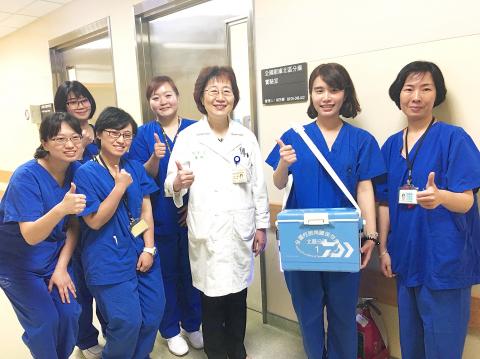A research paper by Taiwanese doctors could change the accepted view that corneas from patients with bacteremia cannot be transplanted and help increase the supply for those awaiting donor corneas.
Standard practice for eye banks is to reject organs donated by bacteremic patients, as they could be contaminated, said National Taiwan University Hospital Department of Ophthalmology director Hu Fung-rong (胡芳蓉), one of the authors of the research paper.
Bacteremia is the condition where bacteria are present in a patient’s blood, which is usually a sterile environment. The cornea is the outer layer of the eye and helps focus vision.

Photo: Lin Hui-chin, Taipei Times
The blood-aqueous humor barrier and the blood-retinal barrier in human eyes make it difficult for bacteria in blood to enter the eyes, Hu said, adding that the cornea itself has no veins and is even less likely to become contaminated.
Recent research has begun questioning the need to reject such tissue from bacteremic donors, which was a catalyst for the research, she said.
The researchers analyzed corneas from 454 donors at the National Eye Bank of Taiwan from January 2014 to June 2017, Hu said, adding that they analyzed 70 sets of corneas from bacteremic donors and 627 sets from non-bacteremic donors.
The blood culture results showed that the average microbial contamination rates of the corneas from bacteremic and non-bacteremic donors were 7.1 percent and 9.1 percent respectively, and they had similar endothelial cell densities, Hu said.
The research paper was on Oct. 15 last year published in the British Journal of Ophthalmology.
Ministry of Health and Welfare Department of Medical Affairs
Director-General Shih Chung-liang (石崇良) on Thursday said that more than 60 percent of corneas for transplant were imported from foreign eye banks, which has consequences for surgery results and costs patients between NT$50,000 to NT$100,000.
The research results could help increase the supply of corneas and further lower the burden on patients, after the National Eye Bank was established in 2013 and the National Health Insurance started covering transplantation costs, Shih said.
Average wait times for cornea transplants have dropped from 123 days to 96.5 days since the eye bank was established, but there is always room for improvement, Hu said.
People should seek a cornea transplant if the top layer of their eye becomes “cloudy” or they develop corneal edema, which can happen due to trauma from traffic accidents, infection or other causes.

‘DENIAL DEFENSE’: The US would increase its military presence with uncrewed ships, and submarines, while boosting defense in the Indo-Pacific, a Pete Hegseth memo said The US is reorienting its military strategy to focus primarily on deterring a potential Chinese invasion of Taiwan, a memo signed by US Secretary of Defense Pete Hegseth showed. The memo also called on Taiwan to increase its defense spending. The document, known as the “Interim National Defense Strategic Guidance,” was distributed this month and detailed the national defense plans of US President Donald Trump’s administration, an article in the Washington Post said on Saturday. It outlines how the US can prepare for a potential war with China and defend itself from threats in the “near abroad,” including Greenland and the Panama

A wild live dugong was found in Taiwan for the first time in 88 years, after it was accidentally caught by a fisher’s net on Tuesday in Yilan County’s Fenniaolin (粉鳥林). This is the first sighting of the species in Taiwan since 1937, having already been considered “extinct” in the country and considered as “vulnerable” by the International Union for Conservation of Nature. A fisher surnamed Chen (陳) went to Fenniaolin to collect the fish in his netting, but instead caught a 3m long, 500kg dugong. The fisher released the animal back into the wild, not realizing it was an endangered species at

The High Prosecutors’ Office yesterday withdrew an appeal against the acquittal of a former bank manager 22 years after his death, marking Taiwan’s first instance of prosecutors rendering posthumous justice to a wrongfully convicted defendant. Chu Ching-en (諸慶恩) — formerly a manager at the Taipei branch of BNP Paribas — was in 1999 accused by Weng Mao-chung (翁茂鍾), then-president of Chia Her Industrial Co, of forging a request for a fixed deposit of US$10 million by I-Hwa Industrial Co, a subsidiary of Chia Her, which was used as collateral. Chu was ruled not guilty in the first trial, but was found guilty

DEADLOCK: As the commission is unable to forum a quorum to review license renewal applications, the channel operators are not at fault and can air past their license date The National Communications Commission (NCC) yesterday said that the Public Television Service (PTS) and 36 other television and radio broadcasters could continue airing, despite the commission’s inability to meet a quorum to review their license renewal applications. The licenses of PTS and the other channels are set to expire between this month and June. The National Communications Commission Organization Act (國家通訊傳播委員會組織法) stipulates that the commission must meet the mandated quorum of four to hold a valid meeting. The seven-member commission currently has only three commissioners. “We have informed the channel operators of the progress we have made in reviewing their license renewal applications, and